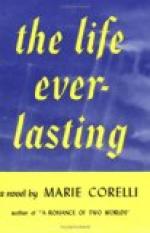“If we could all become what we would be,” said Dr. Brayle, “we should attain the millennium!”
“Are you sure of that?” queried Santoris. “Would it not rather depend on the particular choice each one of us might make? You, for example, might wish to be something that would hardly tend to your happiness,—and your wish being obtained you might become what (if you had only realised it) you would give worlds not to be! Some men desire to be thieves—even murderers—and become so—but the end of their desires is not perhaps what they imagined!”
“Can you read people’s thoughts?” asked Catherine, suddenly.
Santoris looked amused. He replied by a counter question.
“Would you be sorry if I could?”
She flushed a little. I smiled, knowing what was in her mind.
“It would be a most unpleasant accomplishment—that of reading the thoughts of others,” said Mr. Harland; “I would rather not cultivate it.” “But Mr. Santoris almost implies that he possesses it,” said Dr. Brayle, with a touch of irritation in his manner; “And, after all, ‘thought-reading’ is a kind of society amusement nowadays. There is nothing very difficult in it.”
“Nothing, indeed!” agreed Santoris, lightly; “And being as easy as it is, why do you not show us at once that antique piece of jewellery you have in your pocket! You brought it with you this evening to show to me and ask my opinion of its value, did you not?”
Brayle’s eyes opened in utter amazement. If ever a man was taken completely by surprise, he was.
“How did you know?” he began, stammeringly, while Mr. Harland, equally astonished, stared at him through his round spectacles as though challenging some defiance.
Santoris laughed.
“Thought-reading is only a society amusement, as you have just observed,” he said—“And I have been amusing myself with it for the last few minutes. Come!—let us see your treasure!”




